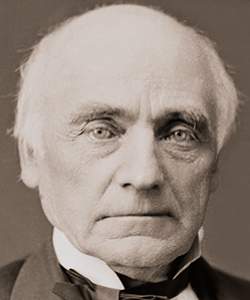Lot Myrick Morrill (Congressional Biographical Directory)
Reference
MORRILL, Lot Myrick, (brother of Anson Peaslee Morrill), a Senator from Maine; born in Belgrade, Maine, May 3, 1813; attended the district schools and Waterville (now Colby) College, Maine; studied law; admitted to the bar in 1839 and commenced practice in Readfield; moved to Augusta in 1841; member, State house of representatives 1854, and senate 1856, and was elected president of the senate; Governor of Maine 1858-1860; elected as a Republican to the United States Senate to fill the vacancy caused by the resignation of Hannibal Hamlin; reelected in 1863 and served from January 17, 1861, to March 3, 1869; member of the peace convention of 1861 held in Washington, D.C., in an effort to devise means to prevent the impending war; resumed the practice of law in Augusta; appointed in 1869 and subsequently elected to the United States Senate to fill the vacancy caused by the death of William Pitt Fessenden; reelected in 1871 and served from October 30, 1869, until his resignation on July 7, 1876; chairman, Committee to Audit and Control the Contingent Expense (Thirty-eighth and Thirty-ninth Congresses), Committee on the District of Columbia (Thirty-ninth Congress), Committee on Appropriations (Fortieth, Forty-first, Forty-third and Forty-fourth Congresses), Committee on the Library (Forty-first and Forty-second Congresses); Secretary of the Treasury of the United States under President Ulysses Grant 1876-1877; appointed by President Rutherford Hayes collector of customs in Portland from 1877 until his death; died in Augusta, Maine, on January 10, 1883; interment in Forest Grove Cemetery.
"Morrill, Lot Myrick," Biographical Directory of the United States Congress, 1774 to Present, http://bioguide.congress.gov/scripts/biodisplay.pl?index=M000970.
Lot Myrick Morrill (American National Biography)
Scholarship
During the Civil War Morrill insisted upon the confiscation of "rebel" property and the emancipation and enfranchisement of southern slaves, and he was easily reelected to a full Senate term in 1863. Predominantly owing to his instigation, laws were adopted emancipating the slaves in the District of Columbia, providing for their education, and granting males of this class the right to vote. In 1868 he delivered a lengthy Senate speech, justifying military Reconstruction of the South, that was one of the most eloquent defenses of Radical Republican doctrines and legislation ever uttered. That same year he voted to remove the impeached president, Andrew Johnson, so that Benjamin Wade, the president of the Senate whose Radical views resembled Morrill's, could become the nation's chief executive.
Norman B. Ferris, "Morrill, Lot Myrick," American National Biography Online, February 2000, http://www.anb.org/articles/04/04-00721.html.



